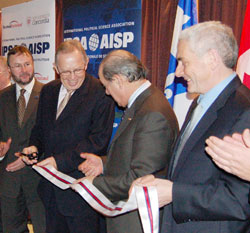Concordia becomes official home of IPSA

Guy Lachapelle (left) participates in the International Political Science Association ribbon-cutting ceremony with IPSA President Max Kaase, President of Montreal International Marc G. Fortier, and Concordia President Claude Lajeunesse.
Photo by alexandre robin
After more than 50 years without a permanent home, the Secretariat of the International Political Science Association (IPSA) now has one, in Concordia’s Samuel Bronfman House on Dr. Penfield Ave.
Members of the university administration and IPSA representatives from around the world gathered at Concordia on March 13 for the inauguration ceremony, which featured a ribbon-cutting ceremony and a lecture by eminent political scientist Robert Keohane.
Keohane, winner of the 2005 Johann Skytte Prize – the equivalent of a Nobel Prize in the political science realm – spoke about global anti-U.S. sentiment, the numerous forms it takes, and its implications for America’s future to a crowd of nearly 650.
He is the world’s leading scholar in the realist school of thought, which dictates that relations between countries are always influenced more by individual interests than a desire to work together. He is an advocate of “soft power,” the use of means other than brute force to encourage interstate cooperation.
Max Kaase is the president of IPSA and vice-president of the International University Bremen in Germany. Before Keohane’s lecture, Kaase said there were many reasons why IPSA’s executive committee unanimously chose to base it here.
“Montreal is a beautiful city. It has many universities and many students,” as well as a rich cultural heritage, he said. “It also has Guy Lachapelle.”
Since he became general secretary of IPSA in 2001, Lachapelle, a professor in Concordia’s Department of Political Science, has worked assiduously to root the organization in Montreal. It has previously been situated in Paris, Brussels, Ottawa, Oslo and Dublin.
“In the end, it was not difficult to sell the committee on Montreal and on Concordia,” Lachapelle said. “They knew the strength of our political science community and of our university.”
He noted that Montreal’s bilingual and cosmopolitan character were two great assets, and said “there is a great tradition of Canada, Quebec, and Montreal being associated with IPSA.”
Montreal hosted the organization’s 1973 World Congress, and Quebec City the 2000 edition, which attracted more than 1,800 participants from 73 countries.
IPSA was founded in 1949 in the wake of the Second World War, and operates under the auspices of the United Nations Educational, Scientific and Cultural Organization (UNESCO).
Its goal is to bring together scholars and students, and to foster tolerance, respect and a broader understanding of political issues. Its membership numbers in the thousands and includes students, individuals and political science associations. For more information, visit the official IPSA website.
“This is something we can all be proud of, because as a university located in a booming city centre, with a campus that is so politicized, we realize part of our mission is to be relevant to the community,” said Concordia President Claude Lajeunesse. One way to do so is to host an international organization like IPSA, and to help promote its activities, he said.
Lachapelle said the office will be a resource centre where graduate students can arrange internships and the public can peruse IPSA’s review of political science publications – the world’s largest – or its own extensive archives. “This will all be accessible at Concordia now.”
